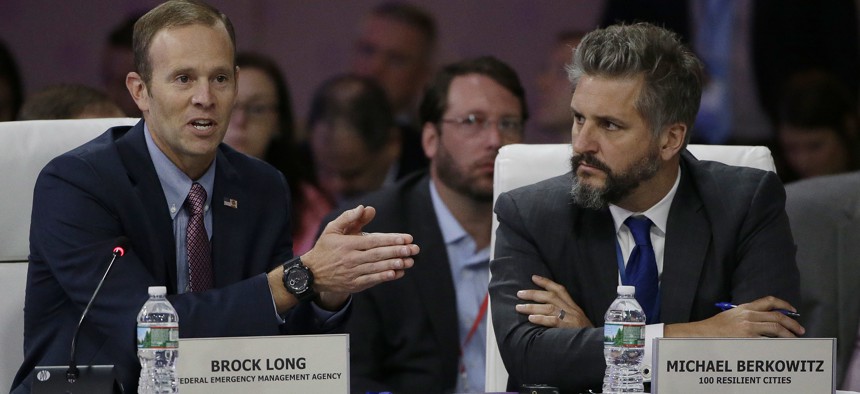Rockefeller Foundation Commits $8 Million to New Climate and Resilience Program

Former FEMA Administrator Brock Long, left, addresses a session entitled "Preparing for the Extreme: Building Resilient Communities" as 100 Resilient Cities President Michael Berkowitz, right, looks on during a 2017 National Governors Association meeting. AP Photo
The move comes as the 100 Resilient Cities initiative supported by the foundation winds down.
With its 100 Resilient Cities organization closing up shop this month, the Rockefeller Foundation this week said it would launch a new initiative focused on similar issues with $8 million of initial funding.
That money will go toward supporting the work of chief resilience officers and member cities that were part of 100 Resilient Cities. Rockefeller committed at least $164 million over the past six years to that global initiative, including funding for cities to hire chief resilience officers.
The foundation announced in April it would end the 100 Resilient Cities program, which also offered cities technical support and a network to share ideas and best practices.
Its new Climate and Resilience initiative will be led by Elizabeth Yee, who served as vice president of resilience finance for 100 Resilient Cities.
The new program will “focus on market-changing opportunities that increase climate and resilience capital flows into solutions and projects that improve the lives of the world’s most vulnerable people,” according to an announcement from the foundation.
“Rapid changes in climate are exposing global citizens to unpredictable risks, and there is an increasing need to leverage data and technology to ensure we make informed decisions, and design and deliver solutions that improve the resilience of communities,” Yee said.
“Continuing to support the 100RC Network is a core part of our ability to understand and tackle these immense challenges,” she added in a statement.
Efforts that took place through 100 Resilient Cities focused on climate hazards, as well as other challenges, which were generally characterized as either chronic “stresses” or acute “shocks.”
Shocks are events like natural disasters that deliver an instant blow to a place. Stresses are problems like high unemployment rates or struggling transportation systems.
One of the things that cities participating in the 100 Resilient Cities program worked on was developing “resilience strategies”—plans for dealing with their shocks and stresses.
For instance, Washington, D.C. issued its plan earlier this year. It outlined 68 initiatives targeting areas that ranged from flood risks to affordable housing.
Michael Berkowitz, president of 100 Resilient Cities said in a statement that the initiative had “incubated the urban resilience movement.”
He added that “funding for the Network will be crucial for the continued implementation of the Resilience Strategies released through our partnership with member cities.”
Raj Shah, the president of the Rockefeller Foundation, in discussing the phase out of 100 Resilient Cities cited “a shift in the foundation’s focus to delivering measurable results for vulnerable people ... with a budget framework that works,” CityLab reported last month.
“This is not about whether 100 Resilient Cities works,” he also said, according to CityLab.
This week’s announcement from the foundation emphasized its continued support of climate and resilience initiatives this year, including a $30 million grant to the Atlantic Council, a D.C. think tank, for the creation of the Adrienne Arsht-Rockefeller Foundation Resilience Center.
Bill Lucia is a Senior Reporter for Route Fifty and is based in Olympia, Washington.
NEXT STORY: Americans Shouldn’t Have to Drive, but the Law Insists on It






